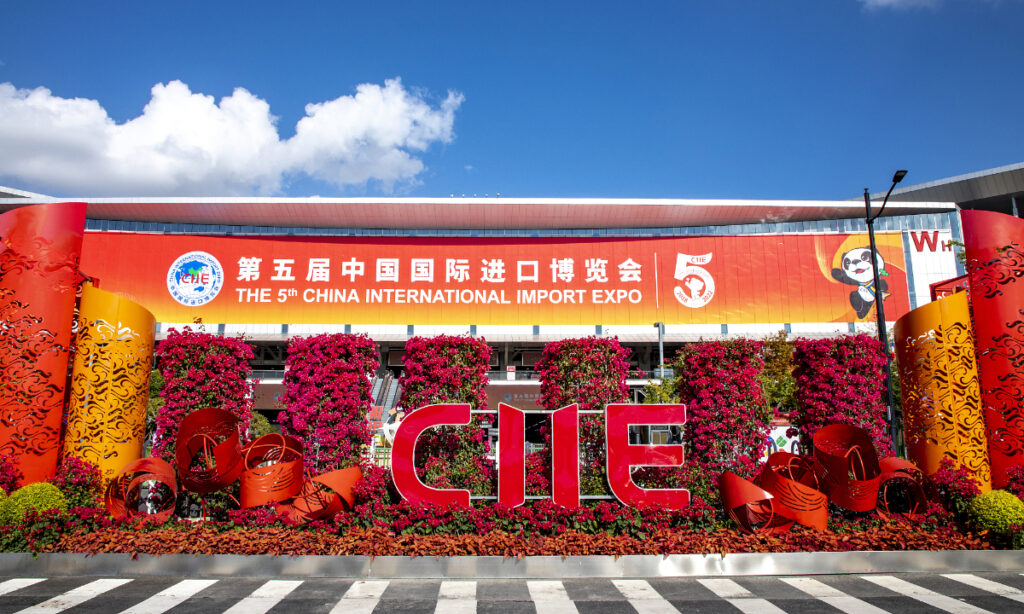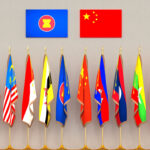Multinational companies (MNCs) have bagged more deals in terms of value, totaling $73.5 billion at this year’s China International Import Expo (CIIE) in Shanghai, as the world’s largest imports trade fair concluded on Thursday.
The successful event, held during COVID-19 epidemic flare-ups, sends a strong positive signal to the world about China’s vast opportunities, economic resilience and willingness on cooperation, experts and participants at the fair have said.
Against the backdrop of anti-globalization headwinds, participants said the event has met with their expectations in terms of providing them with fresh business opportunities, getting to know Chinese customers and people-to-people exchanges, and they said that the event has made them full of confidence in China’s commitment to further opening up its economy amid an economic upgrade.
The major trade fair, with its fifth edition boasting more participating countries and regions, more diverse exhibits and more premium products, saw deals worth over $73.5 billion inked, up 3.9 percent year-on-year, Sun Chenghai, deputy director of CIIE Bureau, said on Thursday.
The 2022 CIIE is the first major international expo held in China after the successful conclusion of the 20th National Congress of the Communist Party of China (CPC), and it comes on the heels of a flurry of diplomatic events that saw the leaders of Vietnam, Pakistan, Tanzania and Germany visiting China.
It struck a high note of China’s opening-up in the new era and underlined China’s unswerving commitment to creating new opportunities for the world through its own development, as the world faces a lingering pandemic, energy crisis, and growing trend of anti-globalization and trade protectionism, experts said.
Representatives from 145 countries, regions and international organizations participated in the expo. More than 2,800 companies from 127 countries and regions attended, bringing with them a total of 438 new products, technologies and services for debut.
A total of 284 out of the world’s top 500 enterprises and industry leading companies attended this year’s CIIE while 48 centrally administered state-owned enterprise (SOEs) held a collective deal-signing ceremony.
The US once again sent the largest country delegation, with 200 companies attending, and a swath of German companies exhibited their products at the show.
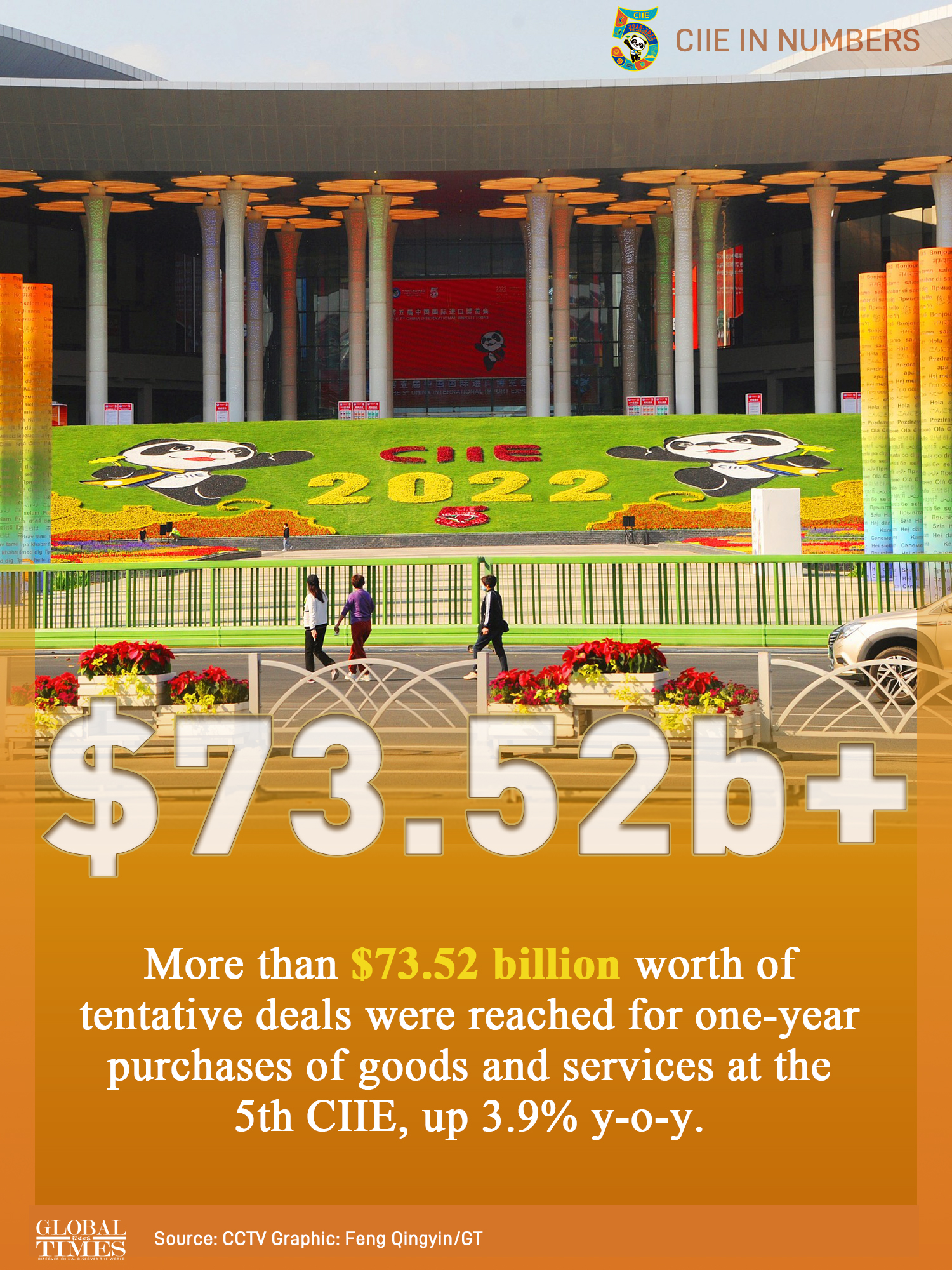
5th CIIE in numbers Graphic: Feng Qingyin/GT
World-class platform for opening-up
More and more global companies and investors have come to see the CIIE as the place to connect with China for further opportunities and to enjoy the fruits of China’s economic development.
The world is being ravaged by the pandemic, the impact of the Russia-Ukraine conflict and soaring energy prices.
In its latest world economic outlook, the IMF downgraded global growth to a meagre 2.7 percent for 2023, down from the 2.9 percent it projected in July.
Wilson Ho, vice president of US-based software company SAS, told the Global Times that as the world faces anti-globalization headwinds and the pandemic continues to batter the economy, the world sorely needs an opportunity and a platform to break the conundrum.
“Each year’s CIIE is a vital platform for China’s continuous opening-up. For MNCs, CIIE is a fabulous platform to showcase their brands. Conversely, we can also say MNCs are increasingly looking at the CIIE,” Ho said. SAS inked a deal at this CIIE with a Shanghai company to develop big data and foster artificial intelligence talents in the Yangtze River Delta.
Gao Shiwang, a director with the China Chamber of Commerce for Import and Export of Machinery and Electronic Products, told the Global Times on Thursday that CIIE has become a well-known venue where China’s SOEs, Chinese local governments and multinational companies can meet and sign deals in a collective fashion. Gao has come to the CIIE for five consecutive years.
According to Sun, a total of 293 trade and investment agreements, valued at $5.9 billion, were also inked at the CIIE.
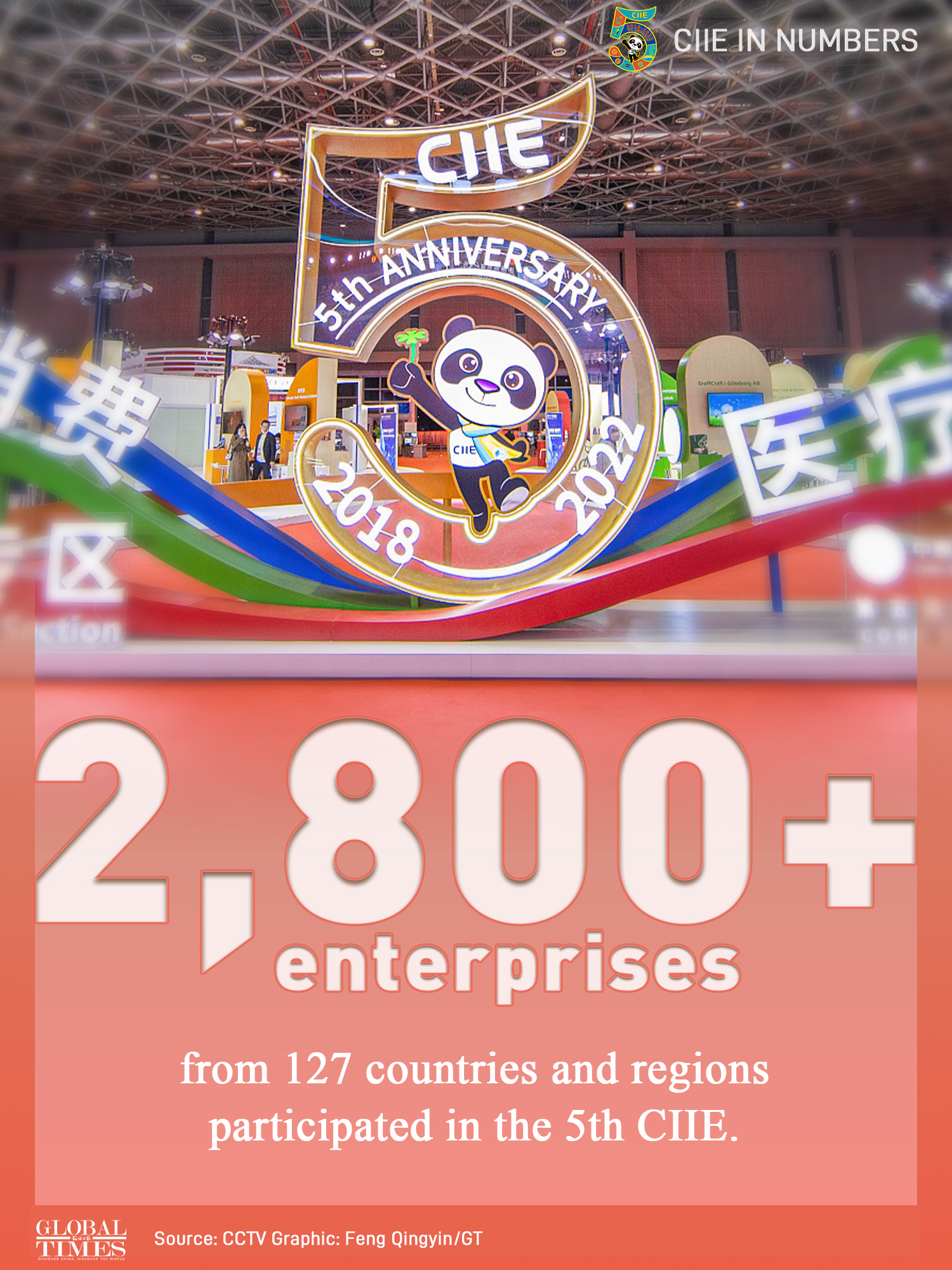
5th CIIE in numbers Graphic: Feng Qingyin/GT
From exhibitor to investor
One of the highlights of this year’s event is that many MNCs have decided to increase their investment in China, such as expanding their plants in the country, rebuking the voices clamoring for anti-globalization and decoupling.
Wei Jianguo, vice chairman of the China Center for International Economic Exchange and former vice minister of the Ministry of Commerce, said that as the world suffers from high inflation, supply disruptions and fractures, China’s supply chain resilience will alter the landscape of global investment.
“The 5th CIIE will be a prelude to great momentum in which global technology, capital and talent move eastward, toward China,” Wei told the Global Times with confidence.
Maximilian Foerst, president of ZEISS Greater China, told the Global Times that for the first time, companies are being blessed with the opportunity to serve China’s first demographic cohort that can spend large amounts on their old age.
Banking on China’s demographic dividends, the German optics giant announced at the CIIE its localization strategy in China, including the establishment of two investment companies dedicated to re-investing company earnings in the Chinese market.
Mark Yu, government affairs general manager, Dow Greater China, told the Global Times on Thursday that the company is dedicated to low-carbon growth in China.
Dow Chemical Co has maintained the pace of landing a new project every 18 months based on an investment deal inked with East China’s Jiangsu Province in 2020, Yu said.
US-based semiconductor company Texas Instruments (TI) on November 6 announced progress in its additional assembly and test capacity in Southwest China’s Chengdu that would more than double its current assembly and test capacity there and automation upgrades to its Shanghai product distribution center, the company said in a statement it sent to the Global Times, saying the move showed “deep commitment to supporting TI’s customers in China.”
It’s not only companies from the world’s developed countries that are betting on China. Companies from less-developed countries such as Iraq, Afghanistan and Sri Lanka are also saying they plan to invest in China.
Chiranjaya Udumullage, president of the China Sri Lanka Association for Trade and Economic Cooperation, told the Global Times that some of the best biscuit and tea companies in his country are planning to set up plants in China.
“Our companies can benefit from China’s great supply chain advantages and significantly slash production costs such as packing materials,” Udumullage said. “The additional benefits would be consolidating our foothold in the world’s largest consumer market-to-be, but also with an eye on other markets with China as a springboard.”
For many companies from the world’s less-developed areas, China is a country that brings constant thrills.
Mohammad Jan Aminzai, president of Afghanistan-based Khwaja Mohanmmd Amin Co, told the Global Times that the planned China-Kyrgyzstan-Uzbekistan railway will boost trade by 80 percent from the current level when completed.
The pine nuts business that has generated at least 100,000 jobs in Afghanistan will further grow several-fold as rail freight is much cheaper than air freight, said the Afghan merchant, who brought a long list of dry fruits to the CIIE.
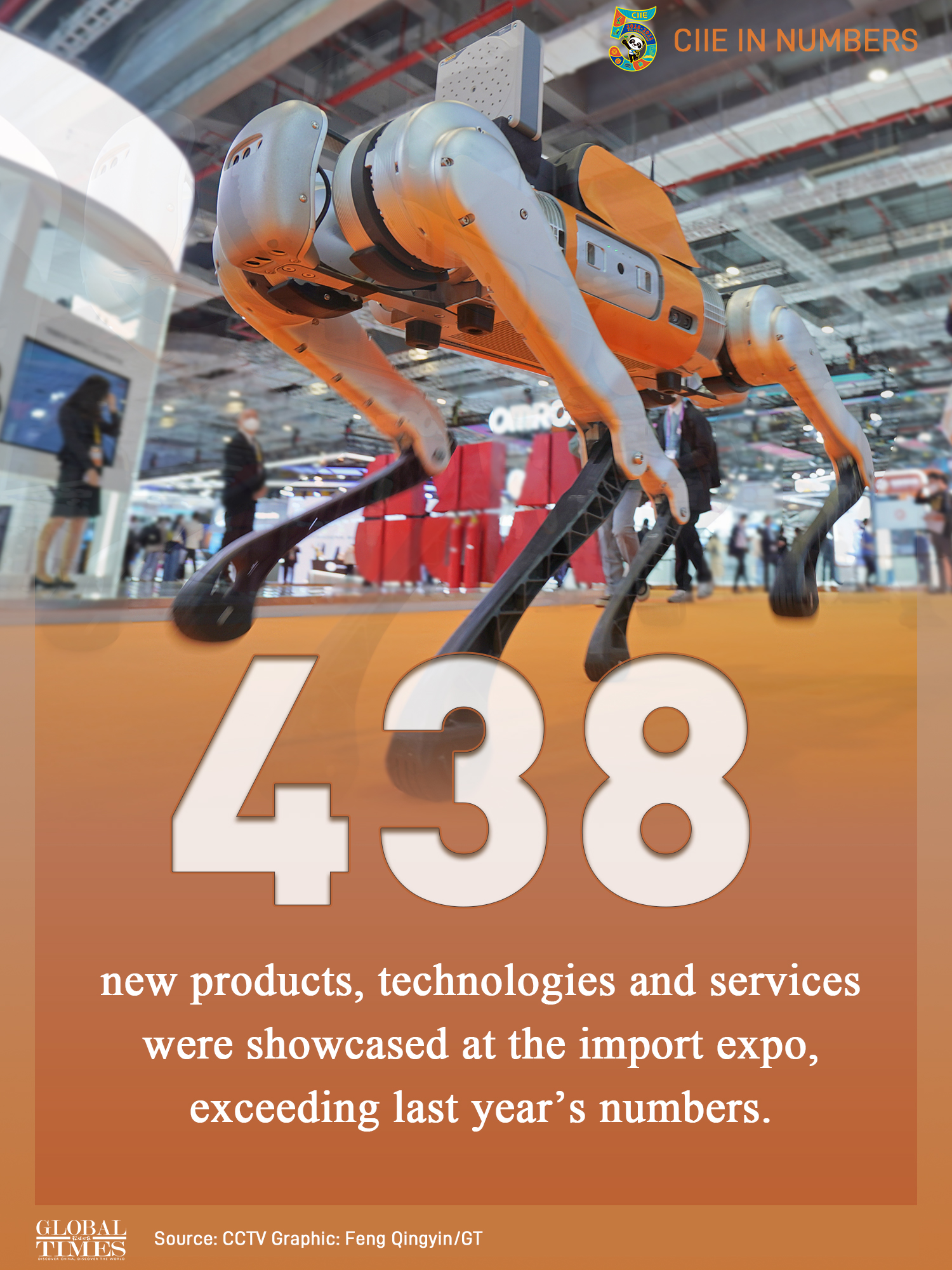
5th CIIE in numbers Graphic: Feng Qingyin/GT
Overwhelming spirit of cooperation
Zhang Yansheng, chief research fellow of the China Center for International Economic Exchanges, participated in the CIIE from November 3 to Monday and is now taking part in the World Internet Conference in Wuzhen, East China’s Zhejiang Province neighboring Shanghai.
“It should be said that those seminars held consecutively this week were very successful. I saw many old friends, such as executives from multinational companies. These executives also said they were willing to do their best to maintain economic and trade ties with China, no matter how US suppresses such cooperation,” Zhang told the Global Times on Thursday.
CIIE serves as a showcase of China’s new development paradigm, a platform for China’s high-standard opening-up, and a type of public goods for the whole world. It is very positive in promoting development, opening-up and promoting exchanges between people, Zhang said. “China is making active efforts for global communication.”
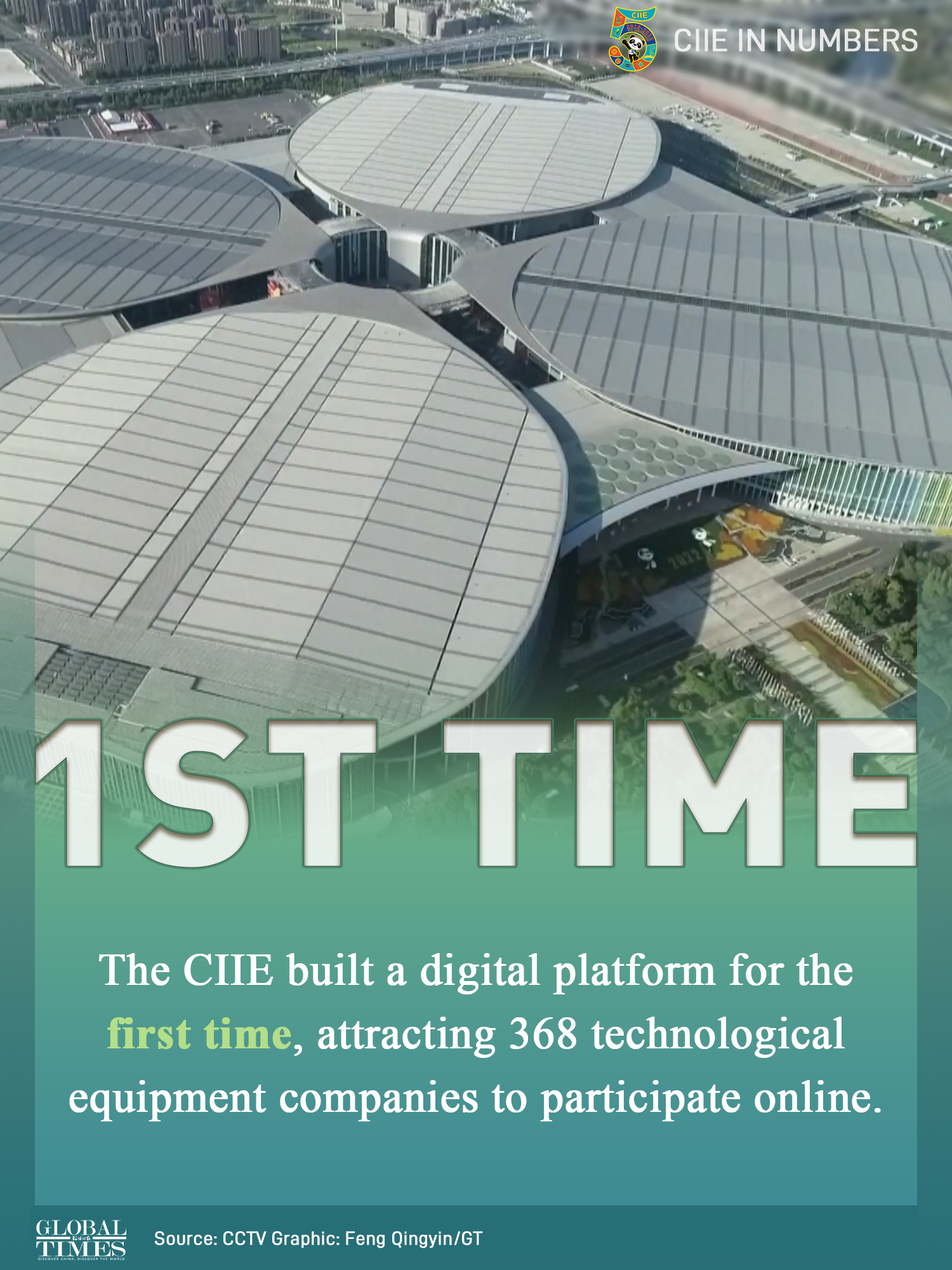
5th CIIE in numbers Graphic: Feng Qingyin/GT
(Global Times)

